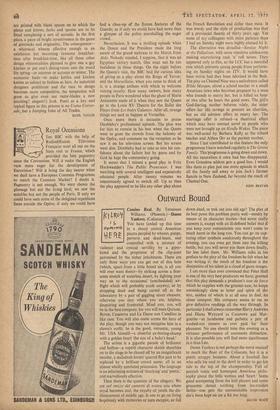Royal Occasions
THE BBC with the help of Radiodiffusion Television Francaise went all out on the State visit to France, which provided the best pageantry since the Coronation. Will it make the English view more eager for the development of Eurovision? Will it bring the day nearer when we shall have a European Common Programme to match the Common Market? I doubt it. Pageantry is not enough. We were shown the plumage but not the living bird; we saw the notables but not the people of Paris. If only we could have seen some of the delighted republican faces outside the Opera; if only we could have
had a close-up of the frozen features of the Guards; or if only we could have had more than a glimpse of the police marshalling the eager crowd.
Nevertheless, it was a thrilling episode when the Queen and the President made the long ascent of the grand' staircase to the March from Aida. Nobody minded, I suppose, that it was an Egyptian victory march. One must not be too fastidious in these things. On the night before the Queen's visit, the BBC had the curious idea of giving us a play about the Reign of Terror; and the Marseillaise, when you come to think of it, is a strange anthem with which to welcome visiting royalty. How many viewers, how many people in Paris wondered what the ghost of Marie Antoinette made of it when they saw the Queen go to the Louis XV Theatre for the Ballet des Fleurs from Les Indes Galantes. After all, strange things are said to happen at Versailles.
Once more there is occasion to praise Dimbleby's professional aplomb. The plan was for him to remain in his box when the Queen went to greet the crowds from the balcony of the Opera, and comment on the reception as he saw it on his television screen. But his screen went dim. Dimbleby had to take us into his con- fidence about the failure but by guess and by God he kept the commentary going.
It seems that I missed a good play in Fritz Hochwaelder's The Public Prosecutor. I was watching with several intelligent and expensively educated people. After twenty minutes we unanimously agreed to switch off. Up to then the play appeared to be like any other play about the French Revolution and duller than most. It was wordy and the style of production was that of a provincial theatre of thirty years ago. Yet some of my colleagues with more patience than I had on Sunday night were highly pleased by it.
The alternative was dreadful—Sunday Night at the Palladium, with some repulsive adolescents making excruciating rock 'n' roll noises. They appeared only in film, as the LCC has a merciful rule which prevents young people from perform-. ing on Sunday nights on ITV. It would have been worse had they been televised in the flesh. The play on Channel Nine was a melodrama called Hilda Morgan, about a school teacher in a small American town who becomes pregnant by a man who intends to marry her, but is killed an hour or two after he hears the good news. The girl's God-fearing mother behaves vilely, the sister offers her life savings to procure an abortion, but an old admirer offers to marry her. The marriage offer is refused—a theatrical effect which may have seemed novel to people who were not brought up on Hindle Wakes. The piece was well-acted by Barbara Kelly as the school teacher and Althea Orr as the puritan mother.
Since I last contributed to this feature the only programme I have watched regularly is The Grove Family. This programme is going down and down. All the naturalism it once had has disappeared. Even Grandma seldom gets a good line. 1 would like them to plan just one more episode in which all the family sail away to join Jack's former fiancée in New Zealand, far beyond the reach of Channel One.
JOHN BEAVAN


































 Previous page
Previous page